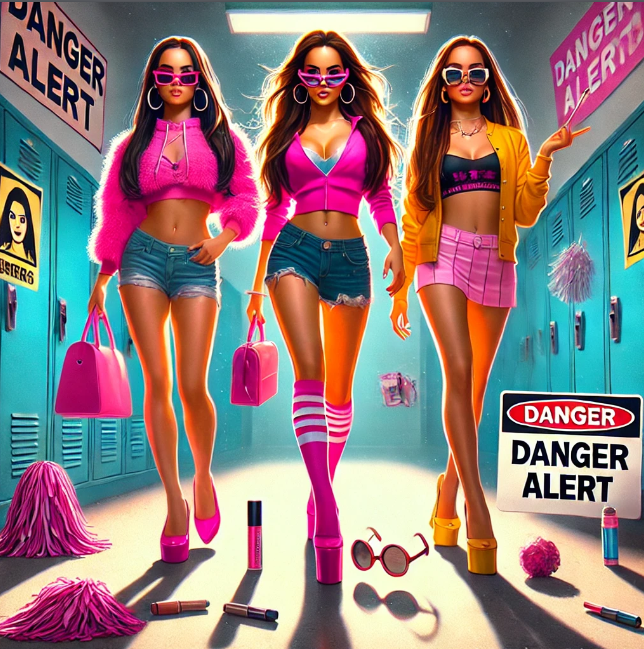Do these names—Brittany, Tiffany, Stephanie, Vennessa, Olivia, Veronica, Regina—sound familiar to you? These are the typical names for the mean girl in YA novels.
This post is for them, the mean girls. What exactly constitutes a mean girl in a YA novel? For starters, she is everything that the female protagonist is not. (That sounded positive, but it is not.)
Let us see, the mean girl is known to have one-night stands and a string of boyfriends and hookups, which is slut-shaming at its best, right in the books young girls read. This is because the virgin girl is considered pure, which of course the protagonist is.
What I find amusing is that in many of these books, the love interest, a guy, has a slew of hookups and girlfriends while also serving as the freaking hero.
Why is this so popular? Here, I think we should be honest with ourselves. This is me attempting to analyze why readers identify with this content so readily, but the truth is that the mean girl is also a reflection of what the readers are not, so it gives them a sense of validation when the nerd or the quirky girl gets the guy. It can also create an image of slut-shaming and judging women based on their hookups and boyfriends being okay.
As for the young male readers, this could give some very interest ideas to them, things like women fighting over men being normal, the idea that a good woman, ‘wife material’ should be pure. (Ugh, I did not like writing that.)
The mean girl frequently serves as an attempt to highlight how great the protagonist is by demonstrating how they are not like the mean girl. However, this begs the question: Why must the protagonist’s greatness require the devaluation of other characters?
And, in each novel, they always have a thing for the hero, making them direct competitors with the heroine for the hero’s affection.(writing that made me cringe.)
Surely, we have moved past the days when women would belittle and discriminate against one another because of a boy? I am aware that the real world still sees women as being against one another and that there is a steadfast call for girls’ girls, but is this also the case in the book world? We should at least get something better there.
The ex being a learning lesson and giving the hero character development? Sure. Maybe he is a better boyfriend because of her? Absolutely. And what do we get? The ex is the female character’s rival rather than a plot device to control the development of the male lead. In addition, two people are usually to blame for a breakup because it takes two to tango. Besides, what about the boy’s taste? The writers seem to be trying to make us believe that the guy first dates a crazy and cruel girl before moving on to a kind and nice girl—quite the opposite. How is that even logical? In actuality, though, the guy in the books is frequently even more at fault because he does not set boundaries or ensure that his former flame does not harass his current romantic partner. (And authors? readers, I might add, find those men incredibly hot—the ones who draw boundaries. 😁)
Now to the most important part, why are feminine things so badly villainized?
Oh my goodness, she is comfortable and confident in her body, wearing short skirts, frocks, and revealing dresses, the horror!
Excuse me, but what? Makeup! God help her.
And she likes talking to and about boys?
And she is a cheerleader? Well, cheerleaders do not exactly require a lot of endurance and practice—wait, they do.
This directly leads to the trope of “Not-Like-Other-Girls,” but that is a topic for another post.
This is not to say that Mean Girls arcs are always bad; some of them, like Regina George, can be iconic, but more and more of that is required; mean girls should be strong characters in and of themselves; they should not be demonized for enjoying feminine things; people are tired of reading about women making fun of each other over a guy.
They could be rivals in a plethora of other ways, and to be honest, it does not always have to be man against man or woman against woman; it can also be woman against man without becoming enemies with lovers.
The point is, writers—I am not sure if this is internalized misogyny, but at the end of the day media does have a significant influence on how people form opinions, and since this is young adult fiction, you are dealing with a large number of young people. If they read this sort of stuff, it may lead them to believe that women who, as previously stated, are serial daters, makeup-ers, and everything else are bad, when in reality, the bad stuff is more like bullying and arrogance, and only that should be demonized.
Besides, to their Harry Potter, our heroines deserve a Draco Malfoy. Not someone with whom they compete for their man. Now, it would be fantastic if the rival was from the protagonist’s past and decided to pursue the protagonist’s man solely to annoy her.
And I rest my case.
Yours
A Fellow Bookworm
P.S–> The photo is taken from Chatgpt


Leave a Reply